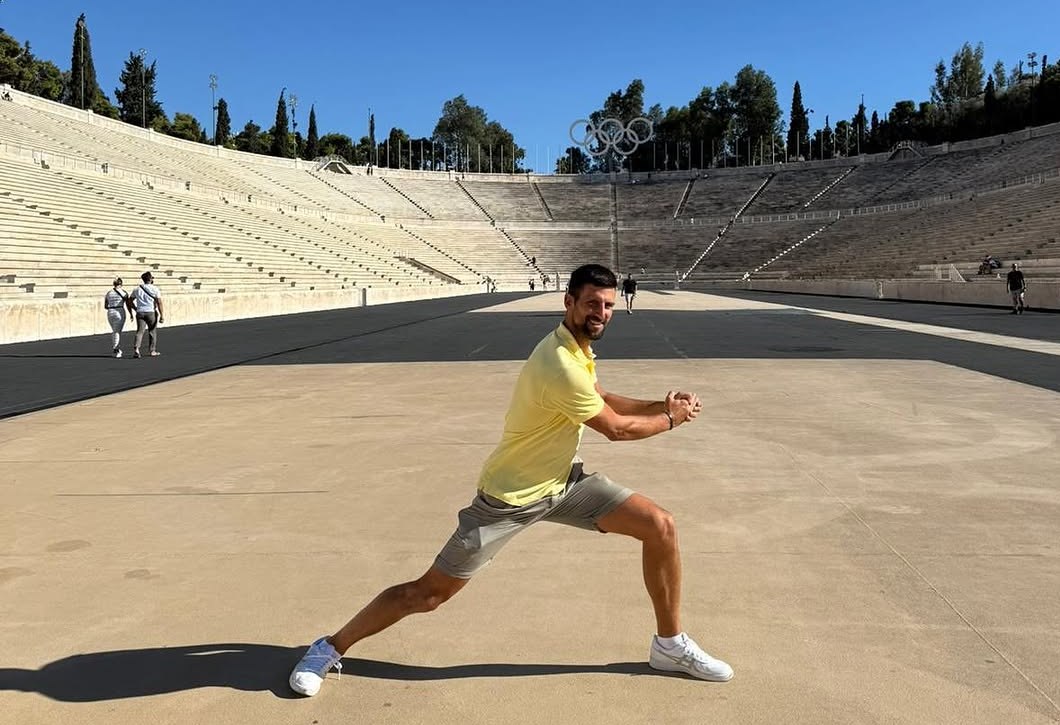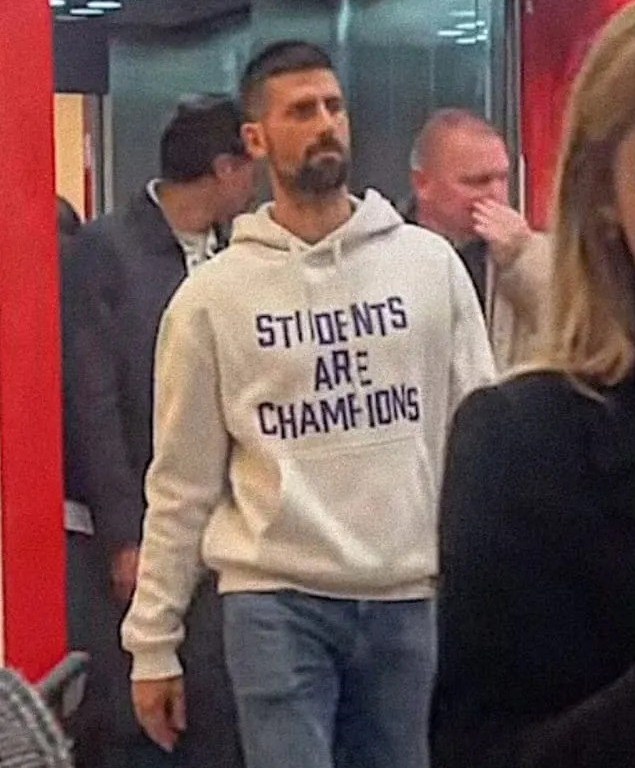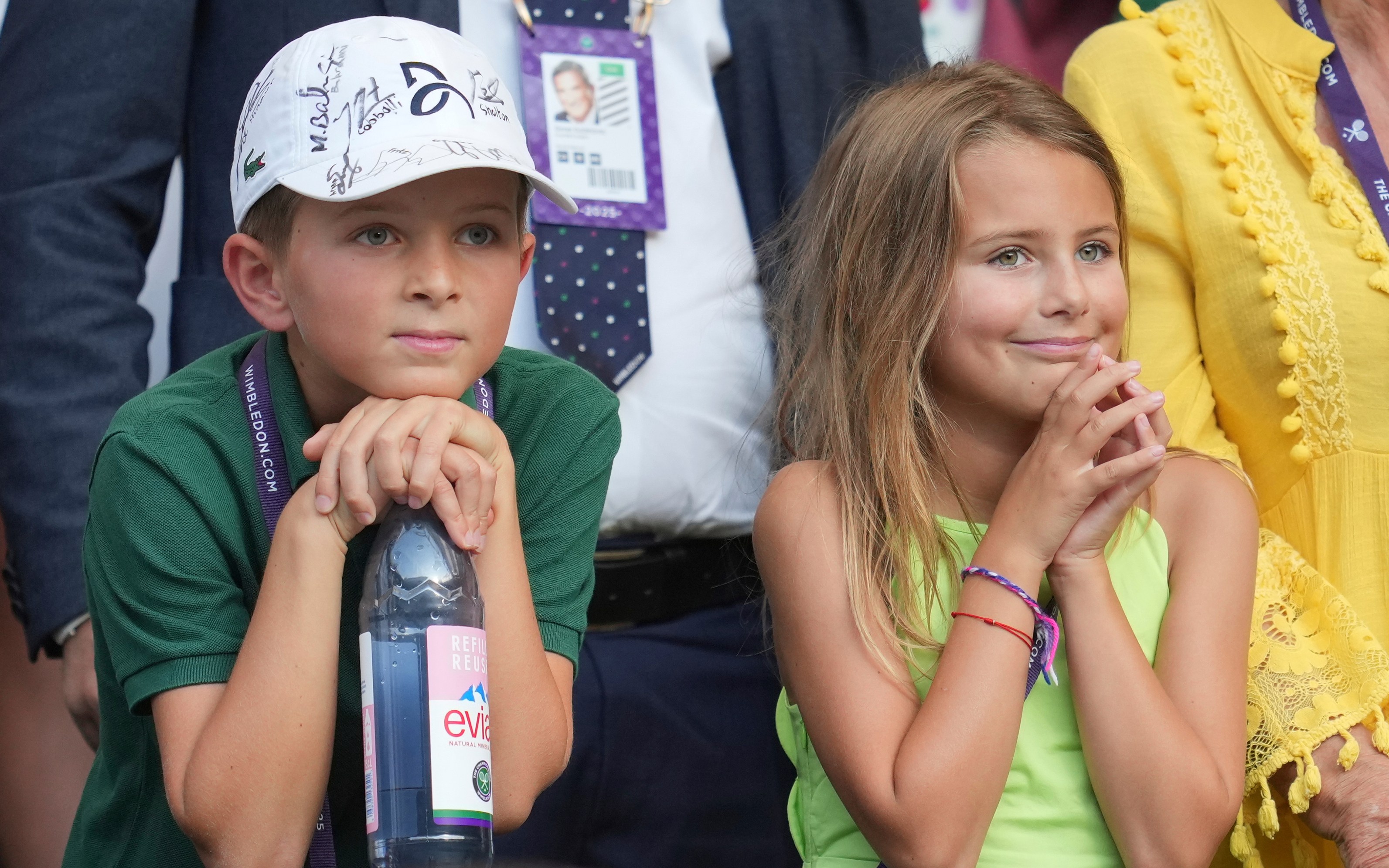If there were no visual or audio indications of the location of Novak Djokovic’s latest tournament appearance this week, you would be inclined to think you were watching live coverage from Serbia. Between the passionate support of the crowd and his heartfelt post-match tributes to the local community, there are all the hallmarks of an event on home soil.
About 500 miles south of Belgrade, it is in fact Athens that has opened its arms to the greatest male player of all time. Two months after rumours first emerged that Djokovic was now living in Greece with his family, he publicly confirmed the move for the first time this week, giving the tournament master of ceremonies the clear and obvious opportunity to adopt him.
“Can we count this as your first hometown win?” Djokovic was asked in the immediate aftermath of his first-round victory at the Hellenic Championship on Tuesday.
In competitive terms, this tournament is no big deal. Categorised on the fourth level of the main ATP Tour circuit as a 250 event — below the grand-slams, Masters 1,000s and 500s — its position in the calendar at the tail-end of a long season does little to give it any prominence.

Djokovic visits the historic Panathenaic Stadium in Athens
In the career of Djokovic, however, it has significance. This is the first chance the 38-year-old has had to play in the country where he and his family now reside, allowing him to see and feel the support he has in his new home — signs reading “Novak, Goat” and “Go, Nole” sum up the general sentiment. It is also of some comfort for a man recently labelled by the Serbian tabloid Informer as “a false patriot who had presented himself as a symbol of Serbia for years only to now flee to Greece”.
The background to Djokovic’s move to Greece is controversial and sad. While he has mostly lived outside of Serbia for the majority of his career, spending much time in Monte Carlo and Marbella, many thought he would settle back in his home nation in time for retirement. Commentators and pundits often pondered whether this national hero would move into politics and even launch a bid for the Serbian presidency.
“Everybody knows Novak in Serbia. He is the man there,” Feliciano López, the Spanish former player, said during his BBC commentary of a Djokovic match at Wimbledon in 2022.
A social-media post by Djokovic in December 2024 has resulted in a deviation from retired life in Serbia. After a collapse the previous month of a station canopy in the city of Novi Sad, which killed 16 people, a wave of protests led by students started, blaming corrupt government contracting under president Aleksandar Vucic. Djokovic soon offered his support for the cause.

Djokovic has shown support for the students and protesters who have ramped up pressure on the government in the year since a fatal railway-station roof collapse in Novi Sad
ANDREJ ISAKOVIC/GETTY IMAGES
“Serbia has enormous potential, and educated youth is its greatest strength,” Djokovic wrote. “What we all need is understanding and respect. With you, Novak.”
As the protests spread nationwide this year, Djokovic gave further backing. He turned up at a basketball match in Belgrade in January wearing a hooded jumper with “Students are Champions” printed on the front. He also celebrated a victory at Wimbledon in July by making a pumping gesture with his arms, seen as a tribute to the protesters’ slogan Pumpaj, which means “keep pumping”.
The backlash from Vucic’s supporters has been ferocious. While Vucic has not publicly spoken out against Djokovic, telling Serbian television in July that he would “never say a bad word against him”, media outlets loyal to the president have not shied away from criticism, labelling him a “traitor” and a “disgrace”.

Djokovic turned up at a basketball match in Belgrade in January wearing a hooded jumper with “Students are Champions” printed on the front
It is probably no coincidence, then, that an announcement followed in August that the scheduled Belgrade Open would be moving to Athens. Owned and organised by Legacy International, a company led by Djokovic’s younger brother Djordje, a statement claimed that “the conditions required to stage the tournament in the planned format and timeframe could not be secured”.
Soon, reports emerged of Djokovic sightings in Greece. His children Stefan, 11, and Tara, eight, were then signed up for St Lawrence College, a British private independent school in Athens offering education “based upon the English National Curriculum and British educational values throughout”.
Greek is now being added to Djokovic’s repertoire of languages — he already speaks fluent Serbian, English, Italian, German, French, Spanish and Portuguese — and was used to great effect when he greeted the crowd in his on-court interview after Tuesday’s victory.

Djokovic is celebrated in murals around Belgrade by his adoring public but media there now call him a “false patriot”
OLIVER BUNIC/GETTY IMAGES
“Good evening, Greece. I love you. How are you? Good, good,” he said before switching to English. “It feels really like home, playing in Athens. It was amazing to experience the great hospitality of the Greek people that Greece is globally very famous for. More than the recognition for my tennis achievement, I feel like people approach me in the most friendly and humane way, and that is something that really touched my heart. Athens is in my heart, no question about it.”
Djokovic has so far preferred not to directly speak of the criticism he has received from Vucic loyalists in Serbia, instead citing the benefits for his family of a new life in Greece.
“It wasn’t something I had planned for a long time,” Djokovic told the Greek outlet SDNA. “Actually, in the last two years, things have happened, decisions have changed in our lives, both privately and professionally. But that’s OK, that’s how life is.
“We have two young children and we are trying to adapt and find the best environment for them as well. Because that is the priority, how the children will grow up in the most beneficial environment for them for their psychological, physical and emotional health. To be in an environment where we feel like we have more time as a family, privately.”
It is all in keeping with Djokovic’s approach on and off the court through the years. No matter the controversy his actions cause — his refusal to be vaccinated against Covid-19 and subsequent deportation from Australia in 2022 being the most notable incident — he has never been one to shirk from his beliefs.

Djokovic says moving to Greece is about finding the “most beneficial environment” for Stefan, 11, and Tara, 8
KIN CHEUNG/AP
“I have so much respect for Novak. If he says something out loud and he believes it, he actually believes it,” Andy Roddick, the former world No1, said on his Served podcast this week. “He will move to Greece because of his belief system and uproot everything, so you have to respect that one way or the other.
“If I’m Serbian, this guy’s on the shortlist of all time… I think of Pelé in Brazil, I think of Michael Jordan in this country [the United States]. He is the biggest thing that has possibly ever existed in his country. For what he’s done in tennis, he’s created a legacy of tennis in his country that’s new and that is changing, and he’s defined so much of the culture there, especially the sporting culture.
“It’s sad to see. It stinks. I’m sure he’s not crazy about it. He has also always shown up and played for Serbia: Olympics, Davis Cup, when he hasn’t had to. At this age, no one would blame him for not showing up for Davis Cup for the last ten years, and he has. So it’s an unfortunate situation.”
Elsewhere, Cameron Norrie reached his second ATP Tour semi-final of the year by recovering from a set down at the Moselle Open in Metz. The British No2 defeated France’s Kyrian Jacquet 4-6, 7-6 (7-2), 6-4 in the last eight and could finish the season up three spots at No24 in the world if he goes on to win the title.

